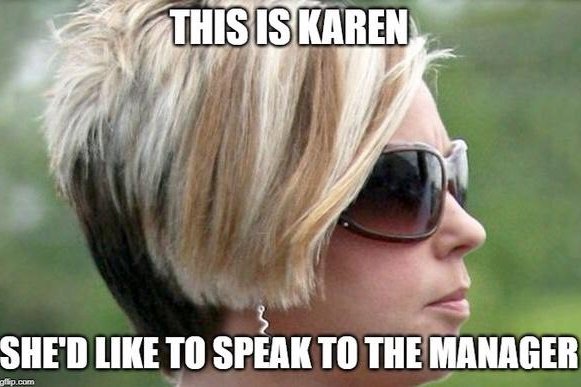
Written By: J. Laura
The Label Used to Describe an Entitled White Woman Could Also be an Actual Name of a Person
“Don’t be a Karen,” “OK Karen” or “She’s such a Karen” are phrases we have all heard of more frequently recently. The term Karen is a name to describe an entitled white woman. But Karen could also be the name of an actual person.
It started off with the infamous Karen video which had gone viral on social media in early June of this year. The Karen in question is reported to be Amy Cooper, according to the New York Post.

Amy, a white woman, called the police on Christian Cooper, a Black man who was bird watching. Christain politely asked Amy to put a leash on her dog while in New York’s Central Park, where signs specify that dogs must be leashed.
In the video, Amy could be heard telling the authorities that an “African American man is threatening my life,” whilst appearing to accidentally strangle her dog. This dubbed the headline, “Central Park Karen” and has since become an internet meme.
After the video received millions of views, the New York Post reported that Amy, the Central Park Karen, was fired from her job at an investment company, forced to surrender her dog temporarily, and was charged with one count of false reporting an incident in the third degree.
Robin Queen, a sociolinguistic professor from the University of Michigan, told The Conversation that “Karen” is referred to as a label for a white woman who had used her privilege to threaten or intimidate another person.
To break down Karen further, Queen explained that names have social cues, especially gender. But it can also convey other information that one may not be aware of, such as age, ethnicity, religion, social class and geography.
Queen mentioned further in The Conversation that before Karen became a pejorative label, it originated as a popular baby name in the 1960s (specifically in 1965), which means that by 2020, a majority of those named Karen are middle aged. In addition, roughly 80% of the U.S. population was white in the 60s, so it’s safe to say that a great number of women named Karen are white.
So, that could indeed be the foundation of Karen and its social meaning in recent times.
But, why Karen?
It largely is a “coincidence,” said Queen. But, “it’s the repeated use of the name on social media and on the street that reinforced its status,” she told The Conversation.
Name-callings like this first came from the African American community where some generic first names have been a way to describe white women who won’t hesitate to use their privilege at the expense of others, Queen mentioned.
Meredith Clarke of the University of Virginia stated in an interview with The Atlantic, that “Karen” has been used previously and for some time — only in a different name. “Karen has gone by different names. Back in the ’90s, when Baby Got Back came out, it was Becky. There will be another name,” she stated.
Of course the goal of name-calls like this is to call out inherent and systematic racism, especially white privilege using some kind of a “flair,” Queen said.
For one woman named Karen, at least, it was a hilarious moment.
“I love it! It’s just so funny!,” she said, as she described her reaction to the famous internet meme.
Karen Lie (pronounced Lee), a recent management and marketing graduate who currently works as an accountant, found what happened to her name was coincidental and amusing.
She was first confused on what actually had happened with the meme, and “found it funny.”
She finds meaning in her name. “My dad named me Karen — they said it was Italian and my father liked the [name],” she told the Emerald.
But she does not find that using Karen as a name-call offensive.
“I feel it’s fine — personally […]. But, I don’t know about other people,” she continued.
When asked whether she wished it was a different name, Lie answered, “Not really though. I mean, it’s just a name.”
“I think it’s fine. Even if they use other people’s names or my name” Lie said. “But you can’t really stop these things — because it’s the internet; there are no barriers in the internet.”
Although name-calls like this are to call out systematic and inherent racism, Lie also wished that “racism will stop.”
Lie mentioned how “You can talk about race more,” and use social media and the internet to spread awareness, as it “is a very big platform.”
As such, she urged for a more “open-discussion” on racism on social media platforms and to look further into other people’s opinion and experiences on racism.
What BuzzFeed’s Article on Racism in Law Enforcement Means for Minority Cannabis Users



Leave a Reply